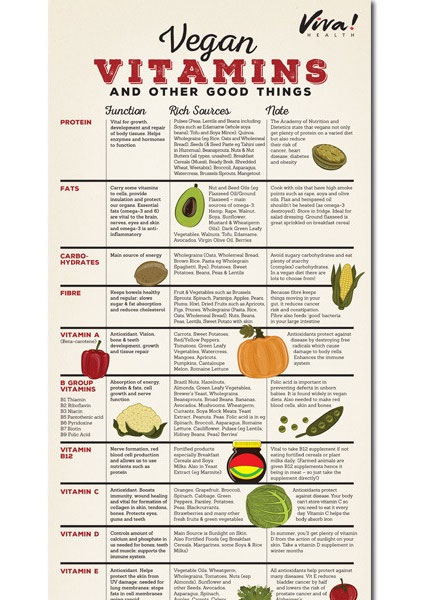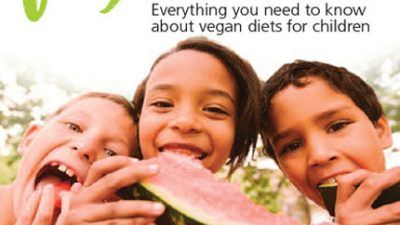Vegan nutrition

A varied diet based on the foods in the table below ensures adequate intake of all essential nutrients and many more beneficial ones such as antioxidants. A healthy vegan diet is one consisting mainly of fruit and vegetables, pulses, wholegrains and nuts and seeds. It provides the body with all it needs and the only vitamin required to be supplemented is vitamin B12. It can be taken either in the form of food supplements or enriched foods, such as plant milks or margarines. B12 supplementation is not only recommended to vegans but to everyone over the age of 50, regardless of the diet, as the body’s ability to absorb this vitamin declines with age.
Over the winter months, vitamin D supplementation is also recommended to everyone in the UK. Not all vitamin D is vegan though – vitamin D2 is and some vitamin D3 can be too but make sure you know the source (most vitamin D3 is animal derived).
To ensure sufficient intake of essential omega-3 fats, natural sources should be made part of a daily diet – milled flaxseed (linseed) or hempseed and their oils for cold food preparation, rapeseed oil for cooking and some nuts and seeds as a healthy addition to meals – eg walnuts and chia seeds.
There are many recent studies analysing the diet composition and nutrient intakes of vegetarians and vegans from across the world:
- In the most recent one, vegan, vegetarian, semi-vegetarian, pesco-vegetarian and omnivore diets were studied and compared in Belgium (Clarys et al., 2014). Vegans had the healthiest weight among all groups and received the highest score on the healthy eating scale (measured by two different ranking systems). The higher the score, the healthier the diet and the lower the risk of a number of chronic and lifestyle related diseases. The fat intake of the vegan group was better (more unsaturated healthy fats and less saturated fats) than in the other groups and they were also found to consume the most fibre and iron. Calcium intake was lower than in the other dietary patterns but still above the UK recommended dose (700 mg). Vegan protein intake was more than sufficient, whilst in meat eaters it reached almost twice the recommended intake levels, which has been shown to have negative health effects.
- A similar study comparing various dietary patterns (omnivore, semi-vegetarian, pesco-vegetarian, lacto-ovo vegetarian and vegan) in the US and Canada brought similar results (Rizzo et al., 2013). Vegans had the healthiest body weights, the highest intake of fibre and the lowest fat intake. The overall fat intake of vegans was healthier than in the other groups – they ate the least saturated and trans fats. The vegan group was found to have more than sufficient intakes of protein, vitamins and minerals (including calcium and iron above recommended intake). Based on the findings, the study authors suggested that the health protective effects of plant-based diets can be ascribed to the generally healthier profile of vegetarian diets.
- When Davey et al. (2003) analysed food intakes of British vegans, vegetarians and meat-eaters, their findings were in line with the above. Vegans had the lowest intake of saturated fats and the highest intakes of fibre, vitamin B1, folate, vitamin C, vitamin E, magnesium and iron. The only mineral that was slightly below the recommended intake in some vegans was calcium but overall, vegans showed to have adequate intakes of all essential nutrients and had the healthiest fat intake profile (the least saturated and the most unsaturated fats). The healthfulness of vegan diets was also confirmed by a later study of UK population in which vegan diets had the best nutrient profiles of all diet groups, including the lowest fat and the highest fibre intakes (Key et al., 2014).
- Orlich et al. (2014) looked at vegetarian and non-vegetarian diets more closely to assess the main differences. They found that vegans eat the most fruit, vegetables, soya and soya products, grains, pulses, nuts and seeds; and the least sweets, fizzy drinks, fried potatoes, refined cereals and added fats. Overall, vegetarian diets, and especially vegan ones, had much healthier patterns than omnivorous diets reflecting that plant-based diets are not based simply on exclusion of animal products but lead to a higher quality diet.
For more information on nutrients, their importance and best vegan sources see our exclusive new resource:







